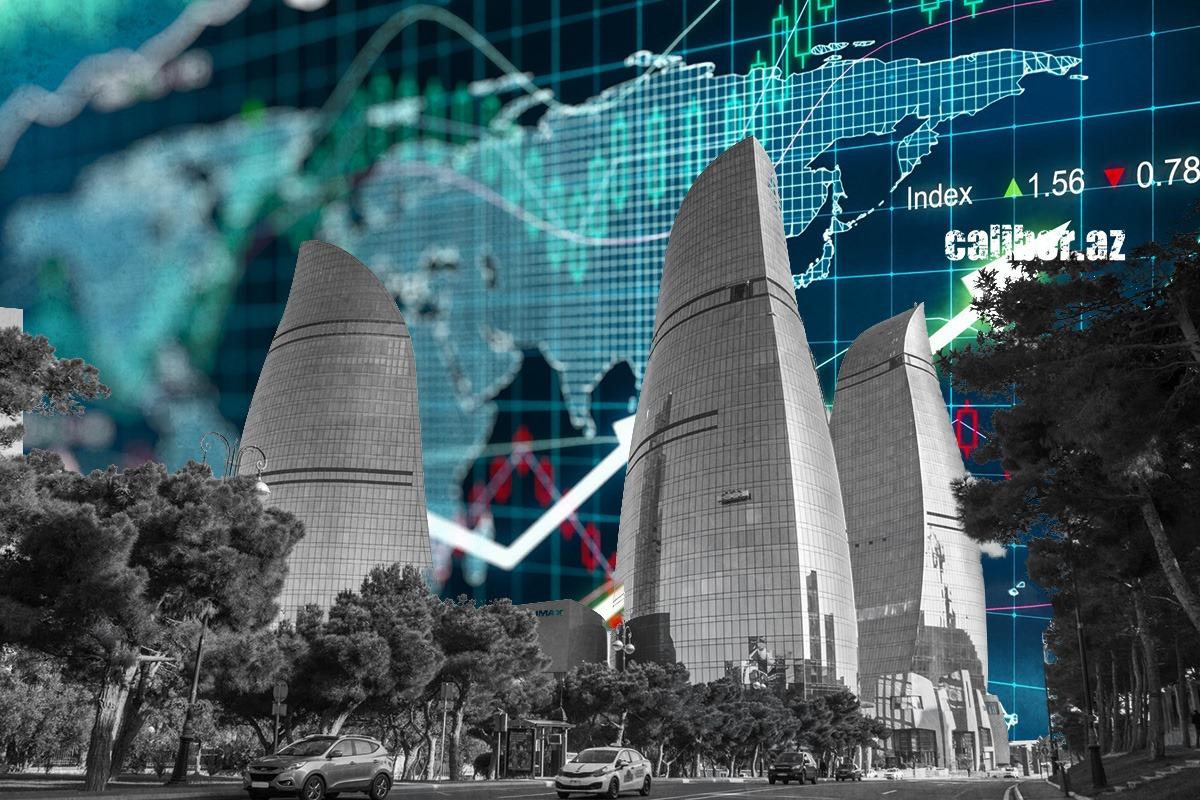On the verge of a global recession: Will Azerbaijan maintain crisis resilience? Anaysis by Caliber.Az
The International Monetary Fund plans to significantly reduce the forecast of global economic growth in its next report. The world has only recently emerged from a pandemic economic downturn when the war in Ukraine multiplied energy and food crises and boosted inflation. The threat of an economic downturn in the US, reduced production in China due to another spike in COVID-19, increasing difficulties in the EU industry because of high prices of energy and raw materials, and disruption of transport links with the Eurasian region loom large on the horizon. These factors also create certain risks for Azerbaijan, but so far the resilience of our country to crises is based on the low level of public debt, growing foreign exchange reserves, and a positive trade balance.
More recently mankind experienced a severe pandemic crisis and the consequential quarantine measures and lockdowns caused considerable damage to the economy, especially in tourism and hospitality, passenger air transportation, and logistics, a number of industries suffered as well, including the automotive industry, electronics, etc. Inconsiderate steps by the US and the EU to bring their economies out of deadlock resulted in the injection of trillions of dollars of unsecured liquidity and keeping central bank interest rates at an extremely low level. The global economy has been reaping the fruit of this risky policy - high inflation - since last autumn.
A new and even more serious challenge for the global economy is the war in Ukraine. The confrontation between the West and Russia and the sanctions regime that grew stronger every month contributed to a slowdown in global economic growth, led to an increase in government debt, and disrupted established transport and logistics links and supply chains. All of this has further ramped up inflation, including an increase in fuel and food prices, which has affected all countries of the world without exception. The developing regions of the world are the most vulnerable in this regard - UN experts believe that the recent mass protests in Lebanon and the hunger riot in Sri Lanka are just the beginning of a series of riots in the most impoverished countries of Africa, the Middle East and Asia, which are already under threat of mass starvation. This is not surprising, since Ukraine and especially Russia are the largest suppliers of food and fertilizers to the world market, accounting for 12% of world exports, with North Africa and the Middle East accounting for 50% of their grain supplies, and these figures reached 90% for East Africa.

Of course, for the highly developed countries of North America, Europe, and Asia the threat of hunger is less acute today, but even here the consequences of high inflation are felt, as food, fuel, electricity, chemical and metallurgical raw materials, fertilizers, and building materials become more expensive. Among other things, this negative is associated with the sanctions pressure on Moscow, the closure of markets in Western countries for Russian energy carriers, raw materials, semi-finished products, and components, as well as the rise in the price of transit logistics with Asian countries due to the rejection of many routes through Russian territory. The scale of these losses was assessed in a recent Dun & Bradstreet report "Impact on Global Business: The Russia-Ukraine Crisis" according to which more than 600 thousand companies worldwide previously worked with Russian and Ukrainian suppliers of raw materials and other capital goods. Tensions in supply chains increase the cost of production, lead to delays in production and service, and increase lead times for order fulfillment.
As a result, due to high electricity and gas costs, European and partly US industries are now forced to reduce production and even shut down plants. According to Bloomberg, energy-intensive industries such as the steel industry, non-ferrous metallurgy, chemicals, fertilizers, construction materials, etc. have been hit hardest. As a result, rising production costs and overheads are reducing demand and sales, unemployment is growing in related industries, and the burden on social funds is increasing.
Bloomberg points out that the lack of cheap energy and other economic problems in Italy, Germany, and a number of other EU countries in the near half-year may lead to a sharp decline in bond and government bond market yields, the euro to US dollar rate will fall to $0.90. Strengthening of the debt crisis is also expected; the beginning of the recession in the euro area is not excluded. The above risks, including the threat of further inflation growth, are evidenced by the intention of the European Central Bank (ECB) to raise key interest rates for the first time in 11 years. This issue will be considered by the ECB at a meeting scheduled for July 21.
The US Federal Reserve (Fed) is planning to take similar measures, with a two-day meeting scheduled for next week. According to the CME Group, 67% of analysts forecast a 75 basis points increase in the discount rate, to 2.25-2.5%, while about a third of analysts expect an increase of 100 basis points, to 2.5-2.75%. Fed rate hikes have traditionally supported the dollar, which is negative for demand for gold and a number of other commodities. These moves are inevitable as US annual inflation accelerated to 9.1% in June, the highest since November 1981. Experts believe that the US has a 35% chance of going into recession by the end of next year amid a tightening of monetary policy. These risks will increase even more if the Fed decides to raise the discount rate to 5.1% by the end of 2023.
In general, the position of the ECB and the Fed coincides with the policy of central banks in a number of other leading countries of the world, which are inclined to increase interest rates against the background of high inflation, which increases fears of a possible recession in the world. The threat of economic downturn is also evidenced by the growth of coronavirus diseases in China observed since April: new outbreaks lead to tightening of quarantine restrictions, which restrains expectations for the economy of the country and increases fears of a possible recession in the Asian region.
Fears of a decrease in economic dynamics of the world are expressed, in particular, by the IMF: the other day Bloomberg cited the words of the director of the IMF department on strategy, policy, and analysis Jeyla Pazarbashioglu, in whose opinion it has become "much more difficult" for politicians to develop a strategy in the current conditions of rising food and energy prices, reduced capital inflows to emerging markets and a slowdown in economic growth in China. "Shock after shock is coming, and it's really hitting the global economy. We will significantly lower our forecast in July," the fund's department director said. To recap, the IMF has already lowered expectations for global economic growth this year from 4.4 percent to 3.6 percent in an April report. In June, the Fund lowered its forecast for US economic growth in 2022 from 2.9% to 2.3% and also lowered its forecast for US real GDP growth in 2023 from 1.7% to 1.0%. By comparison, the global economy, supported by strong financing and low-interest rates on loans, grew 6.1% in 2021.
Nevertheless, the IMF believes that an increase in the refinancing rate of the world's leading central banks, as well as a restrictive monetary policy, is an inevitable and justified anti-inflationary measure, as well as restrictive fiscal initiatives of the government. This is justified even despite the characteristic negative effects - reduced lending and investment, recession in the industry, and other capital-intensive projects. Otherwise, the "cheap money" policy could lead to stagflation, when low economic growth combined with high inflation would further exacerbate the situation, resulting in a severe global crisis.
Azerbaijan which participates in the global division of labor, and whose economy has been long and strongly integrated into the global market, also faces external negative consequences, primarily the high level of imported inflation. To a certain extent, our country is also exposed to other external negatives, including the possibility of a worst-case scenario - the beginning of a global recession. President of Azerbaijan Ilham Aliyev spoke about such risks recently at the meeting devoted to the results of the first half of this year. "Even in the countries, where inflation in the past was less than 1%, today it is close to a double-digit figure. That is, this is a general trend, and we are part of the global economy. Today there is a very high probability that the world economy will be subjected to a recession, and a number of influential international organizations and financial institutions say that the recession is an inevitable fact. We must also be prepared for this," the head of state warned.

At the same time, assessing external risks and the sustainability of the country's economy, the head of state noted that the reforms implemented in recent years have contributed to strengthening the country's economic security and enhanced its reliance on its own strength. In this regard, the President reminded about capital-intensive initiatives implemented in the republic - the reconstruction of Karabakh, huge infrastructure, transport and energy projects, army building, and solutions to social issues. Ilham Aliyev emphasized that Azerbaijan is building its life independently, relying on its own resources. "Several years ago I set a goal to reduce our external debt to 10% of gross domestic product (GDP). According to the figures provided to me on July 1 this year, the country's foreign debt accounts for 10.7% of GDP. It is by far one of the best results on a global scale," the head of state said and emphasized that raising new loans has been minimized and the return of all loans taken earlier is ensured first of all in the republic.
On the other hand, a weighty anti-crisis factor for Azerbaijan is the process of diversification of the economy, and the increase of industrial non-oil clusters intended for export. The country's non-oil exports increased by more than 25%; the positive balance of foreign trade for the first half of the year constituted $12.1 billion. On the other hand, a favorable external environment contributed to the growth of revenues from gas and oil exports that, in its turn, played a significant role in increasing foreign trade by more than 70%. According to experts, a noticeable decline in energy prices is most likely not expected in the current year due to the ongoing sanctions confrontation and the war in Ukraine, as well as the technical impossibility of sharp increase in production in the Persian Gulf and other regions of the world.
According to the forecasts of the Central Bank of Azerbaijan, a large current account surplus is expected by the end of this year, and this strengthens the balance in the foreign exchange market and is the main anchor of monetary stability. In turn, a surplus balance of payments contributes to the growth of strategic foreign exchange reserves in the country: according to the CBA data, strategic foreign exchange reserves in January-May 2022 increased to $54.2 billion, which is a record figure. Thus, Azerbaijan exceeded its peak on October 1, 2014, when its foreign exchange reserves reached the level of $53.7 billion.
Moreover, IMF experts predict an 82.3% increase in the assets of the State Oil Fund (SOFAZ) to $82.076 billion in 2022-2028, and the CBA's foreign exchange reserves to $8.275 billion, averaging $200 million a year. It is obvious that the increasing "safety airbag" in the form of foreign exchange reserves is a reliable buffer protecting the financial system of Azerbaijan from force majeure circumstances, even if the worst forecasts about the global recession come true.








